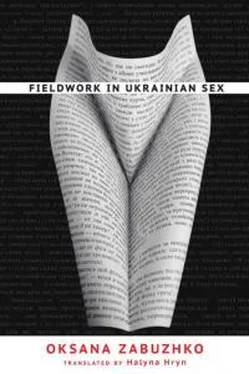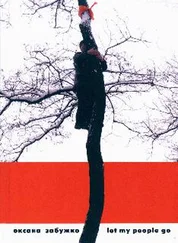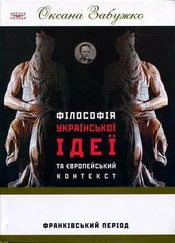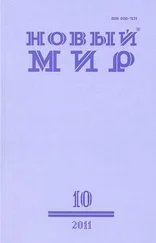Оксана Забужко - Fieldwork in Ukrainian Sex
Здесь есть возможность читать онлайн «Оксана Забужко - Fieldwork in Ukrainian Sex» весь текст электронной книги совершенно бесплатно (целиком полную версию без сокращений). В некоторых случаях можно слушать аудио, скачать через торрент в формате fb2 и присутствует краткое содержание. Город: Las Vegas, Год выпуска: 2011, ISBN: 2011, Издательство: AmazonCrossing, Жанр: Современная проза, на английском языке. Описание произведения, (предисловие) а так же отзывы посетителей доступны на портале библиотеки ЛибКат.
- Название:Fieldwork in Ukrainian Sex
- Автор:
- Издательство:AmazonCrossing
- Жанр:
- Год:2011
- Город:Las Vegas
- ISBN:978-1-61109-008-6
- Рейтинг книги:5 / 5. Голосов: 1
-
Избранное:Добавить в избранное
- Отзывы:
-
Ваша оценка:
- 100
- 1
- 2
- 3
- 4
- 5
Fieldwork in Ukrainian Sex: краткое содержание, описание и аннотация
Предлагаем к чтению аннотацию, описание, краткое содержание или предисловие (зависит от того, что написал сам автор книги «Fieldwork in Ukrainian Sex»). Если вы не нашли необходимую информацию о книге — напишите в комментариях, мы постараемся отыскать её.
Fieldwork in Ukrainian Sex — читать онлайн бесплатно полную книгу (весь текст) целиком
Ниже представлен текст книги, разбитый по страницам. Система сохранения места последней прочитанной страницы, позволяет с удобством читать онлайн бесплатно книгу «Fieldwork in Ukrainian Sex», без необходимости каждый раз заново искать на чём Вы остановились. Поставьте закладку, и сможете в любой момент перейти на страницу, на которой закончили чтение.
Интервал:
Закладка:
Who (what) writes through us?
Lord, I’m scared. I’ve never truly been scared before—not of external threats (those are nothing, there’s always a way out), I’m afraid of myself. I’m afraid to trust my own gift. I no longer believe that it is—in Your hand.
Look down upon me. Please.
In the evenings she escapes to the library—mainly so that she doesn’t stay alone in the house, where despair waits for her in the gathering twilight in order to throw a black sack over her head—but the library can’t save her: none of those more or less well-written other lives, bound in folios with worn spines, that stretch on and on, row after row, from floor to ceiling on multi-storied shelving while she accrues mileage walking up and down in search of the volume that she’s decided she must read—like in the universal cemetery (gray sky, a limitless field out to the horizon of identical gray headstones, and even though you know that behind each there is a person hiding ready to hop out the minute you call him, donning a perfectly living and full-bodied shape, the mere astronomical quantity obliterates any sense in choosing one of them: how many of them, after all, will you be able to resurrect during the course of your life, and how many of these resurrected and read entities have meant anything for you? The most you can do—and that is the maximum!—is to join their monotonous ranks with yet another not particularly noteworthy slim volume, and the “date due” slips glued on the inside covers indifferently demonstrate the absurdity of this whole enterprise: according to them, in twenty years you turn out to be the fifth person at Harvard to borrow Briefing for a Descent into Hell by Doris Lessing—a novel that is mentioned in all literary handbooks and truly deserves it—and the second to fancy the Polish edition of Milosz’s work—whereas most of those recounted lives simply gather dust, like uncollected letters in the numbered pigeon holes of the “general delivery” window at the post office)—not one of those lives has any relevance to hers, not one answers the question that she cannot seem to avoid no matter which way she looks at it, no matter which direction her pathetic hopes turn in search of an excuse: why not now? immediately? why wait?
Beautiful children, we were to have beautiful children, an elite breed. Better not to recall that, right? Well, no, it doesn’t seem to even hurt anymore: you remember—but with your thoughts, not your feelings (hard to say which is worse!). What’s true is true, in slavery the nation degenerates—the crowds that fill Kyiv buses, all those stooped men with drawn, rumpled faces on bowed legs, the women buried under walrus-like gyration of raw-meat dough, young guys with retarded laughter and wolfish bite that bust in without regard to who’s ahead of them (if you don’t step aside—they’ll knock you off your feet and not look back), and the babes with the crudely painted masks over their skin (remove the makeup—and all you’ll find is a naked eggshell surface like in a De Chirico painting) and a persistent aura of some kind of clammy underbathedness—they’re like objects made without love, any which way just to get it over with: had to meet the quota at the end of the quarter, or needed to produce a child to get on the housing list, or simply fucked somewhere in the alleyway or, after some heavy boozing, in a train corridor (she actually rode one of those trains once, from Kyiv to Warsaw, going to a poetry festival—just imagine!—a fierce horde of contrabandists heaving bags, a third-class sleeper car, six open berths per compartment, baggage piled up to the ceiling— commodities , that’s how they called them, by their scientific name in reverence to our own Karly Marx—the stench of the toilet, the door from the sleeper car to the front corridor clung to one hinge, swinging open occasionally to the clatter beyond with a slow, slow creak, like the pain of grinding teeth, the accustomed yet still disgusted expression of the clean-shaven puppy mug of the Polish customs officer who collects—a bottle of vodka from each occupant of the przedział , and that’s not bad at all, the matrons who have just shed a few years from joy rush to assure her as they smooth out their outer garments—phew! we got through!—and pull, from their seemingly bottomless sweatpants, two more miraculously spared bottles of hooch, each of which will go for ten bucks in Chełm: you should see what happened to us at the Yahodyn crossing once, where they told us—we’ll take a woman for every bus, say yes and we’ve got a deal!—A-and what, did you do it?—Well, what else could we do?—at night she lay in the top berth listening to the cacophony of unevenly pitched snoring, painfully in love with her misfortunate people, and the people—they heard her and responded: a massive body loomed in the hushed darkness, a waft of heavy, aroused breathing against her face: “Mommy… baby… Cum’ere, you hear me? Hey, you hear me?”—getting more and more heated as he went—“Wat’s wrong? Let’s go pokey-pokey, huh?” an arm plunged under the blanket—“how about I play wit’ your boobies, eh?”—she shot up, hollering in a well-rehearsed bass: “Back off, sir, please!”—the bitches on the neighboring berths played dead with fear—fear for their commodities , perhaps?—only a tiny granny by the doorway spoke up in a trembling voice: “Leave the girl alone, why are you bothering her?” “Mammashaa!”—he turned and growled—“Mind your own bizness!”—he did heave himself back, though, the mood had been spoiled: he had released some of his dangerously-building aggression, and that’s when she started hollering loud enough to wake the whole train car; and he also, no longer lowering his tone or backing down, roared: “Dontcha worry, cunt, I’ll find’ya and get’ya! I’ll get’ya so bad, it’ll be tits up for you in Chełm, you hear me?”—there was a stopover in Chełm and she ran, her coat under her arm, through all the train cars to the very back, the train conductor, a cachectic young woman with a blanched complexion shook her head with that old-lady Mother-dolorosa look—the things that go on in trains these days, God help us—and let her out the emergency exit—there was no step stool, she had to jump, first throwing down her bags—into the stinging moisture of the early-morning fog, straight into the gravel between the rails, drawing blood as she scraped her palm against it—and straight into the hands of furious Polish cop who’d been racing alongside the train like a greyhound—there’s no exit here, ma’am, show me your documents—she practically threw herself on his chest, hugging him like a brother). Only much later, in fuzzy erotic fantasies (when she was getting divorced from her husband her hungry, lively, corporal imagination was released first—that’s when that slippery-slope slide began—whereas her childlike, or rather, maidenly, barely twenty-year-old, staring-out-into-the-world-with-curiosity readiness for new love switched on only later, finalizing the separation)—returning in her mind back to that night in the third-class sleeper and picking it apart, she tried to play that unrecorded clip: how might have things played out, how and what is it that those people do—out in the passageway between train cars, wheels clanging, back pressed to the railing, groaning, convulsing together with it? or maybe in the bathroom, astride the toilet seat with ankle-deep runny mud smeared all around?— what do they feel at that moment, what do their women feel—the sensual luxury of humiliation, the perverse thrill of momentary descent to the animal kingdom, or, perhaps, and this is far worse, they feel nothing at all? but maybe, hell knows, maybe this really is healthy sexuality in its purest form, no complexes, no paralysis caused by civilization and all its twisted perversions—only, damn it, why do they end up having such ugly children, dwarfed, with faces of tiny adults, expressions set, after about age three of four, like cooled plastic in molds of obtuseness and spite? Once, and not all that long ago, maybe only three or four generations, ladies and gentlemen, allow me to assure you that we were different, and the evidence can be clearly shown on the screen—if we can find a screen and projector somewhere in the auditorium—at least a few images—yellowed, pale photographs of those times showing peasant families frozen in unnatural, stiff poses before the camera: father and mother at the center with hands folded in their laps like schoolchildren, no evidence of birth control whatsoever, and above them towers a whole forest of personages—lads like oaks, one sturdier than the next, a feast for the eyes, uniform gazes sternly aimed at the lens from under their heavy brows, their thick locks of hair painstakingly slicked back, their ox-like necks bursting out of the tightly buttoned collars of their dress shirts; the youngest, who seems to be burning a hole in the photo with his fiery glance, is, of course, still in his high-school uniform and cap, this would have cost a calf every year: but God willing, he’ll get an education, be somebody, because he was such a smart, quick little thing even as a tot—later they perished in all the national battles: Kruty, Brody, and wherever else, those who were to make up our elite—the girls usually posed in national dress: the jangling—you can hear it by just looking at it—heaviness of earrings, coral necklaces, braids and ribbons cast over shoulders, the shimmer of densely embroidered upper sleeves, the rough cut of their skirts and vests does not conceal the luxuriant healthy bodies, ready to give birth; I, however, would like to draw particular attention to the faces, ladies and gentlemen, these beautiful, expressive faces which must have drawn a fair deal of input not only from God’s carvers but also from the many years of lives spent in toil, lives which—if only you don’t insist on constantly ravaging them in search of their sense and meaning, as we fools so often do, and accept them as they are given, like good and bad weather—gradually smooth away from your face all the secondary layers, baring the lean purity of the original—could it be God’s?—sculpture: everything superfluous is tucked in, cleaned up, the foreheads fill out, jaws become more determined, and—the eyes, eyes, eyes shine ever-deeper, the black earth has risen, as the poet wrote, and its glance from time’s distance—is frightful and scrutinizing—what happened to all of them afterward, did they all really die out in the 1933 Famine? Did they perish in the camps, in the NKVD holding cells, or did they simply work themselves to extinction on the collective farms? Good God, we used to be a good-looking people, ladies and gentlemen, open faces, strong, of good stature, self-willed, and firmly rooted in the ground from which many have tried long and hard to rip us out with the flesh until they finally succeeded, and we have flown off, scattered over all the expanses liked plucked feathers from the guts of pillows ripped apart by bayonets, pillows lovingly harbored in hope chests in days of old—for we were always waiting for our big wedding, embroidering songs for ourselves, cross-stitched, word after word, and so throughout our entire little history—well here we are, embroidered. Slavery degenerates a nation, I tell you this yet again, I’m gnawing on this thought until it has no more taste, just so that it would stop gnawing me, like bad weather, like monthly pain in an empty womb— survival , as soon as it takes the place of living , turns into degeneration , that’s right, my Jewish brothers, my dear Ashkenazi, in case any of you happen to be tucked away in this audience by chance—this glass is raised to you, too: you can cast your contemptuous guffaws at the Sabras—dullards, so to speak, hicks, or whatever you call them there—but I will never forget the envious, up-and-down gape of a Kyiv colleague who first saw them, he himself was a small-built, lively demisang with narrow, feminine, raised and tucked-in little shoulders which imperceptibly gave his side view the profile of a hunchback—we traipsed all over Jerusalem together, passing by the hundred-and-umpteenth patrol unit, and the poor guy—couldn’t help himself, gave in: sixty years old, still from Brezhnev’s time, a professor, and a boy who greedily glues himself to a hole in the fence to watch the military parade, a tiny hunched pillar, and as the patrol unit marched off a secret whisper called out something buried even deeper than all the Soviet demisang complexes: “God, they’re gorgeous!”—and those soldiers truly were a sight, like they were deliberately selected—mythological Titans accidentally dressed in camouflage uniforms with automatic rifles over their shoulders, broad mountain-plateau shoulders, movable tree-trunk thighs, strong, bluish teeth glowing against olive tans, as though earth itself came to life and stood up to stride, ah what men, a joy to look at!—in Eastern Europe go try to find yourself such luxurious Semitic giants—it was as if there, among dry hills burnt to ochre, Biblical history proceeds uninterrupted; at any rate these men —in uniform and hoisting automatic rifles who combed the Arab and Christian quarters, moving in the sunlight with the lazy grace of sated predators— could have been the descendants of Abraham and Jacob, whereas my professor—if only because with those little shoulders, pulled in either from cold sensitivity or merely apologetically (cover up, hide, clear your throat obsequiously, and blend with the furniture), he subverted the veracity of the Old Testament: you can’t wrestle angels with shoulders like that, you can’t do much of anything at all except run the tightrope, which is what he did his whole life, as did millions of Ashkenazi, sinking deeper and deeper into their chest cavities with every generation, and then the tightrope snapped, like in that ditty, and everything came crashing down, oh my God, did it ever! Nonetheless, they do still have those hills, burnt to a yellow ochre, where history goes on, but where is our Jerusalem, can somebody please tell me, and where do we look for it?
Читать дальшеИнтервал:
Закладка:
Похожие книги на «Fieldwork in Ukrainian Sex»
Представляем Вашему вниманию похожие книги на «Fieldwork in Ukrainian Sex» списком для выбора. Мы отобрали схожую по названию и смыслу литературу в надежде предоставить читателям больше вариантов отыскать новые, интересные, ещё непрочитанные произведения.
Обсуждение, отзывы о книге «Fieldwork in Ukrainian Sex» и просто собственные мнения читателей. Оставьте ваши комментарии, напишите, что Вы думаете о произведении, его смысле или главных героях. Укажите что конкретно понравилось, а что нет, и почему Вы так считаете.




![Оксана Забужко - Тут могла б бути ваша реклама [збірник]](/books/29264/oksana-zabuzhko-tut-mogla-b-buti-vasha-reklama-zbІr-thumb.webp)

![Оксана Забужко - З мапи книг і людей [Збірка есеїстики]](/books/203319/oksana-zabuzhko-z-mapi-knig-І-lyudej-zbІrka-eseЇsti-thumb.webp)


